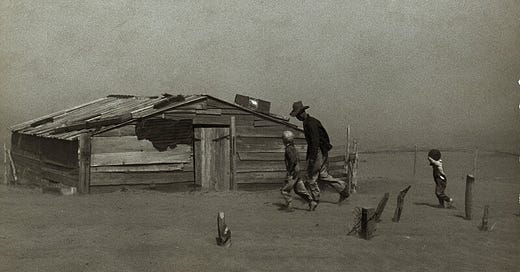Man-made Climate Change and American Exceptionalism
This week PBS premiered the latest Ken Burns documentary. Over four hours the two-part film details the causes behind some of the large scale destructive power of climate change and the resulting human misery. Burns also shows the leadership and vision of the President and the work of government scientists to address the problems during a time of great economic uncertainty. Although the film is concerned with the events of the 1930s the parallels to the droughts, storms and needed economic solutions of today are clear.
As David Remnick writes in the New Yorker
… Obama must now defeat an especially virulent form of magical thinking, entrenched on Capitol Hill and elsewhere: that a difficulty delayed is a difficulty allayed. Part of American exceptionalism is that, historically, this country has been the exceptional polluter and is therefore exceptionally responsible for leading the effort to heal the planet. It will be a colossal task, enlisting science, engineering, technology, regulation, legislation, and persuasion. We have seen the storms, the droughts, the costs, and the chaos; we know what lies in store if we fail to take action. The effort should begin with a sustained Presidential address to the country, perhaps from the Capitol, on Inauguration Day. It was there that John Kennedy initiated a race to the moon—meagre stakes compared with the health of the planet we inhabit.
THE DUST BOWL chronicles the worst man-made ecological disaster in American history, in which the frenzied wheat boom of the “Great Plow-Up,” followed by a decade-long drought during the 1930s nearly swept away the breadbasket of the nation. Vivid interviews with twenty-six survivors of those hard times, combined with dramatic photographs and seldom seen movie footage, bring to life stories of incredible human suffering and equally incredible human perseverance. It is also a morality tale about our relationship to the land that sustains us—a lesson we ignore at our peril.John LoughlinThe opinions expressed in this article are those of the author, and do not necessarily reflect those of the Point Loma Democratic Club of which he is a member.



